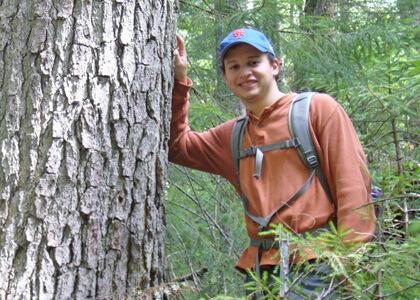This past summer I participated in a Research Experience for Undergraduates (REU) at Hubbard Brook Experimental Forest. Hubbard Brook became known worldwide in the 1960s for conducting experiments about the nutrient budgets of watersheds. Hubbard Brook was also the first place in North America where acid rain was discovered. Hubbard Brook has 50 years of data on the pH of the rainwater and stream water to measure the trend of acid rain.
Since the 1960s a lot of research has been conducted at Hubbard Brook. It was an honor to participate in research at such a well-known and well-respected place. I worked on a project reconstructing the forest disturbance history of the Hubbard Brook Valley.
My mentors for the project were Dr. Scott Bailey, a soil scientist, and Dr. Charlie Cogbill, a forest ecology historian. The project involved creating maps of where historical disturbances had occurred throughout the Hubbard Brook Valley. These disturbances include heavy logging in the early 1900s and hurricanes that hit the valley in 1815 and in 1938. I determined where and when these events happened by reading tree cores.
In 1997, approximately 500 trees were cored throughout the valley. I read these cores using a microscope and counted the rings and measured the distances between certain rings. I was looking for growth releases in the cores. These growth releases occur when the tree has a good growing season. This often happens if the tree receives more sunlight because a neighboring tree has fallen. If these growth releases occurred in a year when a hurricane hit, or during the time of historic logging, I inferred that it was a result of the event happening near that tree. Because the exact location of the cored tree was known, I was able to create maps using ArcGIS to create a visual representation of where these disturbances occurred.
From this experience, I learned a lot about what it takes to conduct professional research. It is important to plan out what you intend to do and how you are going to do it before you get started. It is also important to make sure the topic interests you because it takes a lot of time to complete a research project. Although the skills I learned may have been specific to my project, I feel that I learned enough about conducting research to be able to apply what I learned to other research projects.
My tips for future interns would be to focus on your individual project but to also learn from the other research going on at Hubbard Brook. It is important to conduct good research, but it is equally important to learn as much as you can. A lot of this learning comes from hearing about other research projects and talking to other scientists.
